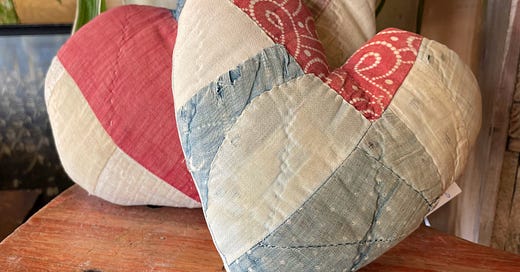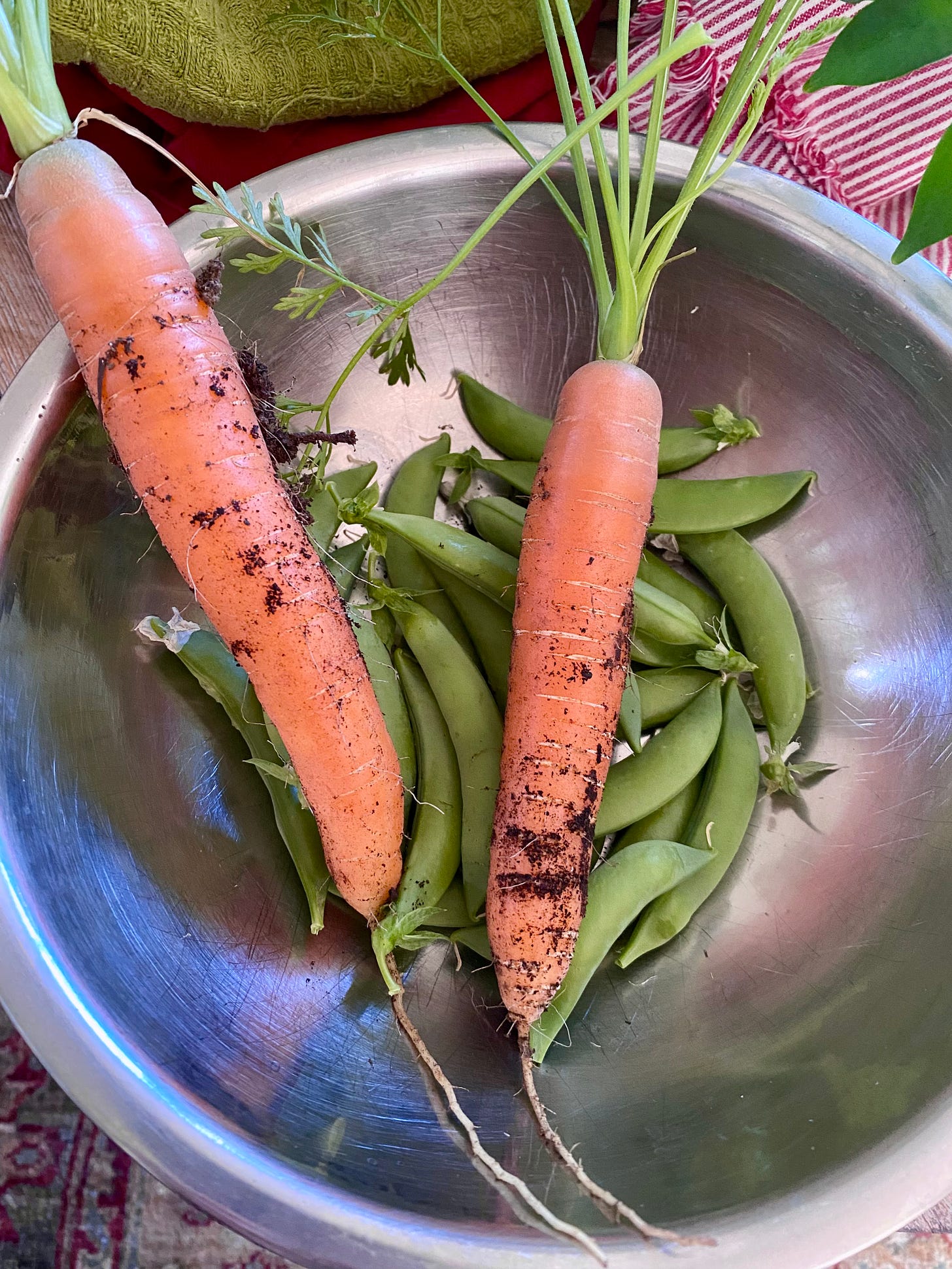It’s been quite a week to be an American, eh? Or someone impacted by Americans.
My heart is battered and I am weary from all the speculating, explicating, and ruminating about what is happening. Both make me hesitant to add to the cacophony of those trying to make sense of what we are living through. And yet, I don’t really know how to write about what it means to live a good, small life without addressing in some way what is happening.
I thought, perhaps, I might re-publish a 4th of July essay I shared on my old blog in 2018, but just six short years later it already feels painfully quaint, words for a time that has passed. It feels written by an idealistic innocent, even as it was about losing idealistic innocence.
Here is how it began:
My children had, in many ways, an idyllic, throw-back childhood. We lived in a small mountain community, where neighborhood kids spent countless low-supervised hours tromping through woods as they acted out epic dramas in imaginary kingdoms built on the banks of the creek and river that ran past our homes.
On the 4th of July, most of us gathered for a parade, led by a local fire truck and an older, beloved couple who dressed as Uncle Sam and Lady Liberty. We all decorated bikes and wagons and walked with the kids and waved to neighbors who lined the streets and waved back. Like something out of a movie about times gone by–except it was our time.
I miss those days.
I miss how sweetly innocent and simple the 4th of July felt then. I miss the optimism I felt for our children’s futures. I miss my ignorance–which was, in many ways, bliss.
Because it’s all different now. My children are grown, and the 4th of July will likely never again be a sweet, simple, or nostalgic holiday for me.
“Oh, honey,” I want to say to 2018 Rita, “you don’t even know.”
I have been thinking this week about the games of Risk my family played when my kids were young, and of how one child would quickly secure Australia and then hang out in the lower corner of the board, quietly amassing resources while the rest of us squandered ours in battle with each other for larger swaths of territory. Then, that child would make their move, and before long it would become apparent that they could not be stopped. More often than not the game would end with a catastrophic scattering of soldiers as another child realized their inevitable demise. I can’t tell you how many times it went that way, even though we all knew the Australia child’s strategy and its effectiveness. Sometimes we made small adjustments to our play, thinking they would make a difference in the outcome, but for the most part we just kept playing the game our same old ways, because we wanted to believe in our belief that our way was right. This time, we’d think, it’s going to be different.
I’ve maintained for quite some time that in the US we are not all playing the same political game. It was hard to see initially, because pieces were moving on the same board, and it seemed as if play was happening within the same set of rules that had always used. But now there is no longer a pretense of agreed-upon rules and norms, and the board has been tossed in the air.
I understand now that most of us are not even the ones playing. We are not the ones rolling dice or devising strategy or moving pieces. We are the the game pieces, the tokens, the little plastic soldiers being deployed, used, sacrificed, or scattered.
Of all the things I’ve read over the past week, the one I most appreciate is Ijeoma Oluo’s “How We Get Through This.”
I appreciate the truth-telling: “Shit’s about to get really tough,” and “We are not in a temporary state of crisis,” help me know that I’m not alone in my interpretation of events, and my interpretation is shared by someone who knows a lot more than I do about a lot of things relevant to our situation.
I appreciate that the piece is grounded in reality AND hope. Hope that is not grounded in reality is false hope, and false hope is toxic. But critical hope is something I need right now.1
I appreciate the list of concrete actions we can all take for our physical, mental, and emotional survival, and the reassurance that we don’t have to do them all (because we probably can’t). Those at the top of my list: Strengthen community connections; get a hobby or two; set boundaries around trauma consumption; know your community resources; support mutual aid and grassroots organizing; build robust information networks; and cultivate joy.
I appreciate the understanding that we all have different resources available to us and different needs to meet. These actions are the ones I can take right now, within the circumstances that define and contain my small life.
In 2018, I wrote that “what I most wish for your 4th is that it be a complicated one, a mix of love and pride and anger and alarm and–above all else–one of resolve to preserve the best of what this day has traditionally stood for.”
The day is not a complicated one for me this year. It will be one in which I allow myself to mourn. Looking back, I can see that my idea of who and what we are began dying when Mitch McConnell refused to allow President Obama to fill an empty seat on the Supreme Court—not that I entirely knew it then. Then, I told myself that my alarm was an over-reaction. I gaslighted myself about the harm that was being unleashed. I wanted so much to believe in my beliefs about the rules of the game and how it is played.
For 8 years, as truths and lies have been revealed, as disruption and loss have worn us down, I’ve been ping-ponging among the classic responses to grief, with denial and bargaining getting heavy play in the rotation. I have not wanted to believe that we are where I feared we are. Now I am ready to stop denying and bargaining (even if only in my head) about things we might do that might restore something that never really existed, anyway. I am ready to put to rest ideas I once had about how my allies and I should play our game.
Don’t get me wrong: I will vote this fall, and I will vote for the candidate who is opposed to autocratic rule, and I will try to convince anyone who wants to talk with me about it why I think that’s such a necessary choice, but I know that the election will be, at best, only a harm-reducing stopgap measure—just as it was four years ago. I am ready to figure out how to move on with acceptance (of whatever reality emerges), critical hope, and strength within the context of my small life.
It feels like the best thing any of us ordinary folks can do. It feels like the pursuit of happiness—true happiness—which might be the most radical thing any of us can attempt in such a time as ours.
Finally, I want to share one more thing with you, a healing and hopeful poem from 26th Avenue Poet Elizabeth: “Somewhere, Always”
Here is a snippet:
This is not the first time; always, somewhere,
everything is falling apart. And somewhere, always,
someone is baking bread or brewing tea,
someone helps a neighbor in their garden, while someone else
sits quiet next to a friend who cannot stop weeping
until they can….
If I could add only one thing to Oluo’s list, it would be to read poetry such as this, something to remind us of what we can do and the importance of doing it, even when things are falling apart.
As always, I’d love to have a conversation in the comments. Please feel free to share whatever this post brings up for you.
Subscribing is easy!
And if you find value in this work, please give it a heart or share it. It means so much to me when you do.
Jeffrey Duncan-Andrade’s work defining different types of hope and their impact on student learning changed me as an educator, and it is absolutely forming my response to current events.








What a balm for the day, Rita. I am also mourning but also nursing the smart of having been manipulated- not only have our political rivals played the long game, they’ve figured out how to play us against ourselves, use our rule following, empathy, and outrage as weapons that weaken us as their rivals. But, they still make us the humans I want to live among. And if we can focus on those one to one interactions you describe we may remember that is a strength, not a weakness.
Hi Rita! Thanks for recommending Ijeoma Oluo’s “How We Get Through This,” I don’t know that I would have found it otherwise. I love her practical but hopeful approach to reality but most of all I really appreciate a good list of concrete steps to take. It often seems I read about our world and then just start spinning off into anxiety with no way of thinking constructively.
I have also always assumed that people (other people apparently) would step up and stop things from happening, whether it’s getting far right leaning politicians elected, or taking away the rights of women, or concentrating power into fewer and fewer hands. Surely people would stop those things?! My naïveté is rather touching but I still find myself thinking “that can’t happen,” even as it is blindingly clear it CAN and has. Our ancestors must be frankly infuriated by us and our inability to learn from their experiences.